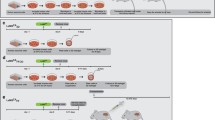Abstract
Pancreatic exocrine cells can be directly converted to insulin+ beta cells by adenoviral-mediated expression of three transcription factors Pdx1, Mafa, and Ngn3 in the adult mouse pancreas (Zhou et al., Nature 455(7213):627–632, 2008). This direct reprogramming approach offers a strategy to replenish beta-cell mass and may be further developed as a potential future treatment for diabetes. Here, we provide a detailed protocol for inducing exocrine to beta-cell reprogramming in mice. We also describe key analyses we routinely use to assess the phenotype and function of reprogrammed cells.
Claudia Cavelti-Weder and Weida Li have equally contributed to this work.
Access this chapter
Tax calculation will be finalised at checkout
Purchases are for personal use only
Similar content being viewed by others
References
Danaei G, Finucane MM, Lu Y, Singh GM, Cowan MJ, Paciorek CJ, Lin JK, Farzadfar F, Khang YH, Stevens GA, Rao M, Ali MK, Riley LM, Robinson CA, Ezzati M (2011) National, regional, and global trends in fasting plasma glucose and diabetes prevalence since 1980: systematic analysis of health examination surveys and epidemiological studies with 370 country-years and 2.7 million participants. Lancet 378(9785):31–40
American Diabetes Association (2014) Diagnosis and classification of diabetes mellitus. Diabetes Care 37(Suppl 1):S81–90
Butler AE, Janson J, Bonner-Weir S, Ritzel R, Rizza RA, Butler PC (2003) Beta-cell deficit and increased beta-cell apoptosis in humans with type 2 diabetes. Diabetes 52(1):102–110
Foulis AK, Liddle CN, Farquharson MA, Richmond JA, Weir RS (1986) The histopathology of the pancreas in type 1 (insulin-dependent) diabetes mellitus: a 25-year review of deaths in patients under 20 years of age in the United Kingdom. Diabetologia 29(5):267–274
Dor Y, Brown J, Martinez OI, Melton DA (2004) Adult pancreatic beta-cells are formed by self-duplication rather than stem-cell differentiation. Nature 429(6987):41–46
Teta M, Long SY, Wartschow LM, Rankin MM, Kushner JA (2005) Very slow turnover of beta-cells in aged adult mice. Diabetes 54(9): 2557–2567
Nir T, Melton DA, Dor Y (2007) Recovery from diabetes in mice by beta cell regeneration. J Clin Invest 117(9):2553–2561
Xu X, D'Hoker J, Stangé G, Bonné S, De Leu N, Xiao X, Van de Casteele M, Mellitzer G, Ling Z, Pipeleers D, Bouwens L, Scharfmann R, Gradwohl G, Heimberg H (2008) Beta cells can be generated from endogenous progenitors in injured adult mouse pancreas. Cell 132(2):197–207
Inada A, Nienaber C, Katsuta H, Fujitani Y, Levine J, Morita R, Sharma A, Bonner-Weir S (2008) Carbonic anhydrase II-positive pancreatic cells are progenitors for both endocrine and exocrine pancreas after birth. Proc Natl Acad Sci U S A 105(50):19915–19919
Rosenberg L (1998) Induction of islet cell neogenesis in the adult pancreas: the partial duct obstruction model. Microsc Res Tech 43(4):337–346
Bonner-Weir S, Toschi E, Inada A, Reitz P, Fonseca SY, Aye T, Sharma A (2004) The pancreatic ductal epithelium serves as a potential pool of progenitor cells. Pediatr Diabetes 5(Suppl 2):16–22
Bonner-Weir S, Baxter LA, Schuppin GT, Smith FE (1993) A second pathway for regeneration of adult exocrine and endocrine pancreas. A possible recapitulation of embryonic development. Diabetes 42(12):1715–1720
Zhou Q, Brown J, Kanarek A, Rajagopal J, Melton DA (2008) In vivo reprogramming of adult pancreatic exocrine cells to beta-cells. Nature 455(7213):627–632
Thorel F, Népote V, Avril I, Kohno K, Desgraz R, Chera S, Herrera PL (2010) Conversion of adult pancreatic alpha-cells to beta-cells after extreme beta-cell loss. Nature 464(7292):1149–1154
Ferber S, Halkin A, Cohen H, Ber I, Einav Y, Goldberg I, Barshack I, Seijffers R, Kopolovic J, Kaiser N, Karasik A (2000) Pancreatic and duodenal homeobox gene 1 induces expression of insulin genes in liver and ameliorates streptozotocin-induced hyperglycemia. Nat Med 6(5):568–572
Collombat P, Xu X, Ravassard P, Sosa-Pineda B, Dussaud S, Billestrup N, Madsen OD, Serup P, Heimberg H, Mansouri A (2009) The ectopic expression of Pax4 in the mouse pancreas converts progenitor cells into alpha and subsequently beta cells. Cell 138(3):449–462
Chung CH, Hao E, Piran R, Keinan E, Levine F (2010) Pancreatic beta-cell neogenesis by direct conversion from mature alpha-cells. Stem Cells 28(9):1630–1638
Zhou Q, Melton DA (2008) Extreme makeover: converting one cell into another. Cell Stem Cell 3(4):382–388
Szymczak AL, Vignali DA (2005) Development of 2A peptide-based strategies in the design of multicistronic vectors. Expert Opin Biol Ther 5(5):627–638
O'Dowd JF (2009) The isolation and purification of rodent pancreatic islets of Langerhans. Methods Mol Biol 560:37–42
Acknowledgment
We thank Jennifer Hollister-Lock for revising the manuscript. This work was supported by NIDDK and HSCI. W. L. is supported by a postdoctoral fellowship from the Juvenile Diabetes Research Foundation (JDRF). C. C-W. is supported by postdoctoral fellowships from the Swiss Science Foundation (SNF) and the Swiss Foundation for Grants in Biology and Medicine (SFGBM).
Author information
Authors and Affiliations
Corresponding author
Editor information
Editors and Affiliations
Rights and permissions
Copyright information
© 2014 Springer Science+Business Media New York
About this protocol
Cite this protocol
Cavelti-Weder, C., Li, W., Weir, G.C., Zhou, Q. (2014). Direct Lineage Conversion of Pancreatic Exocrine to Endocrine Beta Cells In Vivo with Defined Factors. In: Kidder, B. (eds) Stem Cell Transcriptional Networks. Methods in Molecular Biology, vol 1150. Humana Press, New York, NY. https://doi.org/10.1007/978-1-4939-0512-6_17
Download citation
DOI: https://doi.org/10.1007/978-1-4939-0512-6_17
Published:
Publisher Name: Humana Press, New York, NY
Print ISBN: 978-1-4939-0511-9
Online ISBN: 978-1-4939-0512-6
eBook Packages: Springer Protocols




